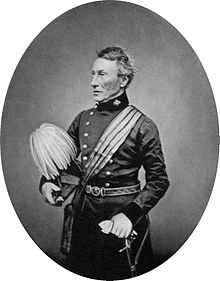Francis Rawdon Chesney
| Francis Rawdon Chesney | |
|---|---|

General F.R. Chesney in 1863
|
|
| Born |
16 March 1789 Annalong |
| Died | 30 January 1872 (aged 82) |
| Allegiance | British |
| Service/branch | Royal Artillery |
| Years of service | 1805-1847 |
| Rank | General |
| Commands held | 7th Company, 4th Battalion Royal Artillery |
| Awards | Royal Geographical Society’s gold medal |
Francis Rawdon Chesney (16 March 1789 – 30 January 1872) was a British general and explorer.
He was a son of Captain Alexander Chesney, an Irishman of Scottish descent who, having emigrated to South Carolina in 1772, served under Lord Rawdon (afterwards Marquess of Hastings) in the American War of Independence, and subsequently received an appointment as coast officer at Annalong, County Down, Ireland. F. R. Chesney was born there, on 16 March 1789.
Lord Rawdon gave the boy a cadetship at the Royal Military Academy, Woolwich, and he was gazetted to the Royal Artillery in 1805. But though he rose to be lieutenant-general and colonel-commandant of the 14th brigade Royal Artillery (1864), and general in 1868, Chesney’s memory lives not for his military record, but for his connection with the Suez Canal, and with the exploration of the Euphrates valley, which started with his being sent out to Constantinople in the course of his military duties in 1829, and his making a tour of inspection in Egypt and Syria. In 1830, after taking command of 7th Company, 4th Battalion Royal Artillery in Malta, he submitted a report on the feasibility of making a Suez Canal. This was the original basis of Lesseps’ great undertaking (in 1869 Lesseps greeted him in Paris as the “father “ of the canal); and in 1831 he introduced to the home government the idea of opening a new overland route to India, by a daring and adventurous journey along the Euphrates valley from Anah to the Persian Gulf. Returning home, Acting Lt Colonel Chesney (as he then was) busied himself to get support for the latter project, to which the East India Company’s board was favourable; and in 1835 he was sent out in command of a small expedition, on which he took a number of soldiers from 7th Company RA and for which Parliament voted £20,000, in order to test the navigability of the Euphrates.
...
Wikipedia
